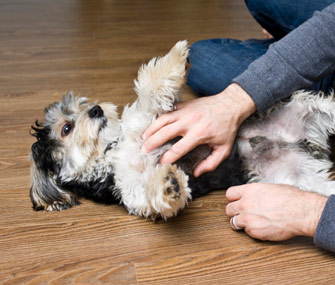Why Does My Dog… Like to Have His Belly Rubbed?
Published on March 01, 2013
Skip To

Who Likes Belly Rubs?
Dr. Margaret Gruen, DVM, MVPH, Diplomat of the American College of Veterinary Behaviorists and a Veterinary Behaviorist at the North Carolina State University College of Veterinary Medicine, notes that although both cats and dogs expose their bellies, their reasons can differ. Cats often lie on their backs in a defensive posture, which is not an invitation for a belly rub, she explains, while dogs have other motives. “Dogs expose their bellies as part of a submissive display, sometimes during play, and with people they are comfortable with,” says Dr. Gruen. The submissive element doesn’t mean that the pup is not enjoying the rub. If the dog is comfortable with the person who is petting him, the pup will sometimes roll onto his back to increase belly access. “It seems that in these dogs, the belly rub feels good,” she says.A different behavior occurs when a dog rolls on his back as soon as he is approached. “These dogs may be showing submissive behavior,” explains Dr. Gruen, “especially if it is accompanied by other submissive postures such as tucking tails or licking lips.” In these cases, attempting a belly rub is not the best response — at least not at first, as the pup could feel intimidated by someone leaning in for a rub. “For these dogs, the best way to make them feel comfortable is to get low, as by sitting down, and call the dog over without leaning or reaching over them,” says Dr. Gruen.
To Rub or Not to Rub
Dr. Gruen says that generally, when a dog rolls over for a belly rub, there’s no reason not to give one. But it is important to note that rolling a dog onto his back in order to give him a belly rub (if the dog did not roll there himself) is not advised, as “it can make the dog anxious and upset.” Dr. Gruen says there are situations where tummy rubs may not be desired. “Watch your dog for cues that he would like a belly rub — dogs may not wish to expose their bellies in all circumstances, such as when outside or in unfamiliar surroundings.”You don’t need to be concerned if your dog doesn’t like having his belly rubbed, notes Dr. Gruen, because just like people, he may have different ideas about what feels good. “However, a dog owner may need to be concerned if a belly rub, or any gentle handling, is associated with aggression,” she adds. For instance, if your dog growls during a belly rub, Dr. Gruen advises you just get up and walk away. She also suggests that you contact your veterinarian, because “pain, illness and behavioral disorders can contribute to aggression, and should be addressed with a professional.”
More on Vetstreet:
- 5 Best Dog Breeds for Your Golden Years
- Why Does My Cat.. Hate Belly Rubs?
- Why Does My Dog… Sleep Belly Up?
- Top 10 People-Pleasing Dog Breeds
- 15 Quietest Dog Breeds





